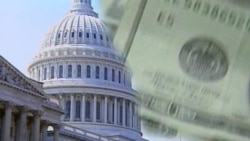NEW YORK —
Wall Street is keeping an eye on efforts in Washington to forge a political deal that would avoid automatic tax increases on every American January 1. Those increases, referred to as the “fiscal cliff,” could lead to an economic downturn. Investors are cautious but not overly concerned, at least not yet.
The famous statue of a bull in New York’s Financial District is surrounded, as usual, by tourists and passersby getting their pictures taken at this symbol of upward market movement.
In a nearby office, Peter Cardillo, chief market analyst for Rockwell Global Capital, says the market is indeed bullish, closing the year with strong gains.
“Had that not been the case, had the market really been fearful of no deal, we certainly wouldn’t be trading at these levels. We’d probably be 10 to 15, possibly 20 percent down from these levels," he said.
Cardillo says he expects Republicans and Democrats to reach a deal by December 31 or even shortly after. But he warns of serious consequences if automatic tax increases are not averted.
“The greatest fear would be, obviously, going into a steep recession, but also getting a ratings cut by the agencies, and as of now, they’re on hold," he said.
Analysts note some investors are mindful of the fiscal cliff and are selling stocks before year end to lock in tax advantages, just in case.
Meanwhile, shopper Rafael Espinal is among consumers who cut back on holiday spending this year.
“You know I think everyone is very mindful to how much money they're spending this year because of the previous year with the recession and also the incoming fiscal cliff as well," he said.
Michael Graves, a New York City election employee, works near the statue of the charging bull. Like many in the area, he doubts the United States will fall over the fiscal cliff, but says the underlying economic problems have been long in the making.
“I think it is something that American society has been building up to through successive generations. It’s not a Democratic problem, it’s not a Republican problem; it’s a problem of the society and its expectations," he said.
But with the prospect of falling off the fiscal cliff just days away, most Americans expect Republicans and Democrats to reach agreement to avoid the possibility. Peter Cardillo puts none too fine a point on it. “Politicians, he says, are stupid, but they’re not that crazy.”





